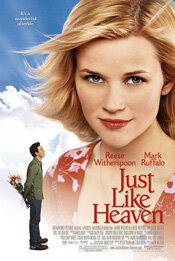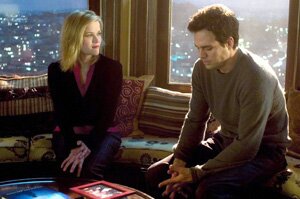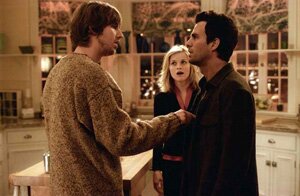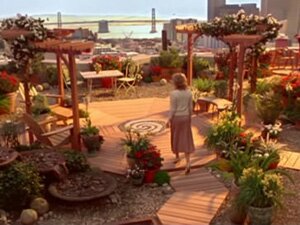 Directed by Mark Waters
Directed by Mark Waters
I liked Just Like Heaven (2005) though I also found moments of frustration because it would lose the likeable elements sporadically with a weak moment. It’s a romantic comedy that, like The Holiday (2006), overstates its romance (at least in the third act). It also misses a few times on the comedy.
Yet overall, this is a good movie because for the most part it has a smart script, good direction and good performances. It’s just that those first two occasionally falter.
It uses a standard Hollywood movie type – the ghost story that isn’t scary but comedic as the ghost discovers to his or her alarm that they are dead and have to figure out where to go from there. The first clever little twist the movie employs is by making its ghost not a ghost.

Reese Witherspoon as Elizabeth isn’t dead. She’s in a coma following an accident. But her spirit has been shaken loose and is now wandering, rootless.
As a spirit, she goes to her old apartment where she meets Mark Ruffalo as David, a kind of gardener-landscape architect whose wife died two years earlier, a loss that has sent him into a depression that involves drinking and gloomy apathy.
Of course, the scenario is utterly unrealistic but, as Roger Ebert points out, “In a movie like this there is no logical reason for such matters. They simply are, and you accept them.”
Just Like Heaven is the same type of movie that 1937’s Topper belongs too. Where it differs is maintaining (and largely managing) the dark element implicit in the scenario, whereas Topper is indifferent to that aspect. I prefer the Topper approach but Just Like Heaven better reflects contemporary sensibility and is a kind of linchpin for its romantic element.

The movie works best in the first two acts where the romance between Elizabeth and David is underplayed and the jarring aspects of their situation are emphasized. I’ve seen at least one review where some scenes, such as those where Ruffalo is talking to Elizabeth but seen by other characters to be speaking to himself or an imaginary friend, as being old, clichéd scenes.
They’re correct in saying that some of those scenes don’t work well but they’re wrong in saying it is because they are old and clichéd. Those scenes can be incredibly funny – that is why they are often used (and humour is often about repetition). What is occasionally missing in those scenes is an understanding of what it is that makes them funny.
What is funny is not the character talking to seemingly nothing. The funny is in the reaction of other characters. Think of the old TV show The Beverly Hillbillies. The Clampett’s would do outrageous, absurd things that were funny but the real kicker was in the reactions of characters like Mr. and Mrs. Drysdale, which were often exaggerated, at least to a degree.
In Just Like Heaven I found such reactions generally understated by comparison and thus not nearly as funny as they could have been.

I also found that once the third act kicked in, while the comedy became wilder due to the situations, the movie was more interested in the romance. And when everything resolved in the manner of romantic comedies it was dragged out and over-emphasized (particularly visually).
Given the lighting, editing and camera work, the movie’s ending would have been cloyingly sweet were the actors not performing as well as they were.
So, once again we have a romantic comedy that is heavy handed with its romance and a bit frugal with its comedy, a not uncommon problem.
For the most part, though, this movie works far better than most and is worth watching.
As final note, one of the few supporting actors playing a character in the manner of characters you would find in classic romantic comedies, is Jon Heder as a kind of spacey, yet better-informed and intelligent than everyone else, psychic. His scenes are wonderful.


